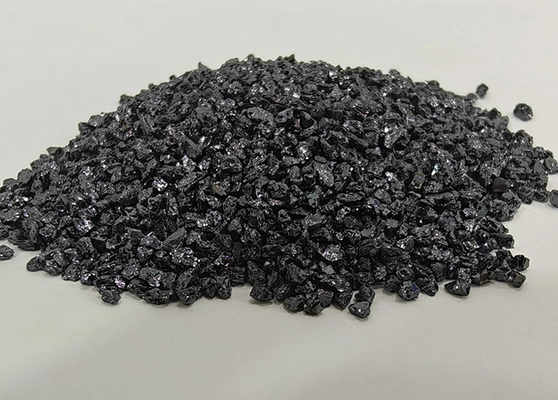Quick Answer
Silicon carbide powder (SiC) is a high-hardness synthetic material widely used for lapping, polishing, sintering, and metallurgical applications. When purchasing SiC powder, buyers should consider purity (97–99.9%), grit size (F240–F1200 or micronized), particle-size distribution (D10/D50/D90), and surface treatment. Trusted suppliers provide FEPA/JIS-compliant grading, ISO 9001 quality control, and COA/SDS documentation to ensure process consistency and performance reliability.
Table of Contents
- 1. What Is Silicon Carbide Powder?
- 2. Key Properties and Chemical Composition
- 3. Types of Silicon Carbide Powder
- 4. How to Choose the Right Grade
- 5. Industrial Applications
- 6. Packaging, Storage, and Handling
- 7. How to Source from Reliable Suppliers
- 8. Why CanAbrasive Is a Trusted SiC Powder Supplier
- FAQ
1. What Is Silicon Carbide Powder?
Silicon carbide powder is produced by crushing high-purity SiC crystals into controlled fine particles. Depending on the production route—Acheson furnace or refined chemical vapor reaction—these powders offer superior hardness (Mohs 9.2–9.5), high thermal conductivity, and chemical stability. It is available as black SiC and green SiC, each suited to specific finishing and refractory processes.
2. Key Properties and Chemical Composition
High-quality SiC powders are valued for their combination of mechanical strength, oxidation resistance, and heat tolerance. Below are typical properties:
| Parameter | Black SiC | Green SiC |
|---|---|---|
| SiC Purity | 97–99% | ≥99% |
| Mohs Hardness | 9.2 | 9.4 |
| Thermal Conductivity | ~120 W/m·K | ~150 W/m·K |
| Grain Shape | Angular, tough | Sharper, brittle |
| Color | Black or dark gray | Light green |
| Magnetic Content | Low, demagnetized | Low, demagnetized |
3. Types of Silicon Carbide Powder
The market typically offers three major classifications based on grain size and intended use:
- Macro-grits (F12–F220): Used in bonded abrasives, grinding wheels, and sandblasting.
- Micro-grits (F240–F1200): Ideal for precision polishing, wafer edge grinding, and compound blending.
- Micronized powders (<10 μm): Utilized in advanced ceramics, sintering feedstocks, and semiconductor substrates.
4. How to Choose the Right Grade
Choosing the appropriate silicon carbide powder depends on your process requirements:
- Abrasive applications: Choose black SiC with moderate toughness for grinding and lapping of metals.
- Precision polishing: Green SiC powder provides cleaner surfaces and minimal contamination risk.
- Refractory and sintering: Use coarse or submicron SiC powders with controlled oxygen content (<1%).
- Metallurgical refining: Prefer low-impurity grades with guaranteed C/Si balance.
Look for FEPA / JIS grading certification and consistent D10/D50/D90 control on the certificate of analysis (COA).
5. Industrial Applications
Silicon carbide powder is indispensable across multiple industries due to its hardness, chemical inertness, and heat resistance:
- Abrasives: Lapping, polishing, and superfinishing of metals, glass, and ceramics.
- Refractories: Crucibles, kiln furniture, and furnace linings.
- Metallurgy: Used as a deoxidizer and carburizer in foundries and steelmaking.
- Advanced Ceramics: Key raw material for sintered SiC (SSiC) and reaction-bonded SiC (RB-SiC) parts.
- Optics & Electronics: CMP (chemical mechanical polishing) and semiconductor wafer finishing.
6. Packaging, Storage, and Handling
- Standard packaging: 25 kg PE bags or 1,000 kg jumbo bags.
- Store in a dry, ventilated area to prevent moisture absorption.
- Use dust masks and gloves when handling fine powders.
- Custom packaging and OEM labeling available upon request.
7. How to Source from Reliable Suppliers
To ensure consistent performance, buyers should verify the following before purchasing SiC powder:
- ISO 9001 certified production with batch traceability.
- FEPA or JIS compliant grading system.
- COA, SDS, and third-party test reports (e.g., SGS).
- Clear logistics capability (EXW, FOB, CIF, DDP).
- Technical support for custom particle-size distributions.
8. Why CanAbrasive Is a Trusted SiC Powder Supplier
CanAbrasive supplies both black and green silicon carbide powders manufactured under strict ISO and FEPA standards. Our powders are available from F240–F1200 and micronized cuts down to sub-5 μm. Every batch undergoes in-house PSD testing and magnetic separation for consistent performance.
- Reliable production capacity and short lead time.
- Custom D10/D50/D90 control for OEM customers.
- Global shipping with safe moisture-proof packaging.
- COA, SDS, and MSDS provided per shipment.
Learn more: Black Silicon Carbide Powder · Green Silicon Carbide Powder · Silicon Carbide Suppliers Overview
FAQ
What is the typical purity of silicon carbide powder?
Black SiC powder usually contains 97–99% SiC, while green SiC powder exceeds 99% purity, with minimal free carbon or silica impurities.
How do I select the correct grit or micron size?
Use FEPA or JIS standards as your guide: F240–F800 for abrasives and F1000–F1200 or submicron cuts for polishing or sintering processes.
Is silicon carbide powder reusable?
In abrasive applications, partial reuse is possible, but efficiency declines as grains round off. For sintering, only virgin powder ensures consistency.
Can silicon carbide powder be shipped globally?
Yes. CanAbrasive provides international delivery via sea or air freight, packaged in moisture-proof jumbo bags with export documentation.
Do you offer OEM/private label packaging?
Yes, custom packaging and labeling services are available for distributors and OEM buyers.
